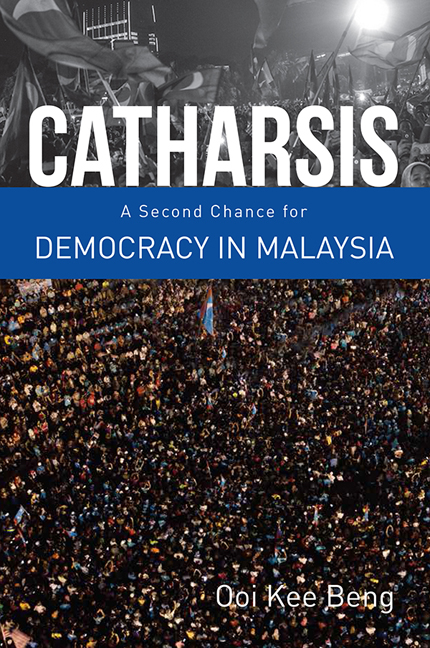Book contents
- Frontmatter
- Contents
- Foreword
- 1 Introduction – Malaysia's Future Is Redeemed
- Before Pakatan Harapan
- 2 After All These Years, Malaysia Is Still Held Hostage
- 3 Beyond the Nationalism Trap
- 4 Federating Malaysia — A Continuous and Troubled Process
- 5 Funeral for a True Son of Penang
- 6 Let's Work Out What Malaysia Is Good For
- 7 The Unity Fetish
- 8 When the National Narrative Loses the Script
- 9 Let's Be Cosmopolitan and Leave Multi-ethnicity Behind
- 10 Noses Don't Grow Back
- 11 Mahathir's Bersatu is Best Understood as an NGO
- Before 9 May 2018
- With Mahathir at the Helm
- Beyond 9 May 2018
- About the Author
7 - The Unity Fetish
from Before Pakatan Harapan
Published online by Cambridge University Press: 12 February 2019
- Frontmatter
- Contents
- Foreword
- 1 Introduction – Malaysia's Future Is Redeemed
- Before Pakatan Harapan
- 2 After All These Years, Malaysia Is Still Held Hostage
- 3 Beyond the Nationalism Trap
- 4 Federating Malaysia — A Continuous and Troubled Process
- 5 Funeral for a True Son of Penang
- 6 Let's Work Out What Malaysia Is Good For
- 7 The Unity Fetish
- 8 When the National Narrative Loses the Script
- 9 Let's Be Cosmopolitan and Leave Multi-ethnicity Behind
- 10 Noses Don't Grow Back
- 11 Mahathir's Bersatu is Best Understood as an NGO
- Before 9 May 2018
- With Mahathir at the Helm
- Beyond 9 May 2018
- About the Author
Summary
fe•tish
noun \’fe-tish also ‘fē-\
: a strong and unusual need or desire for something
: a need or desire for an object, body part or activity for sexual excitement
: an object that is believed to have magical powers
The Collective Individual
Malaysia is a land of diversity. However, the need to adopt the nationstate structure to replace colonialism disposed the country's postcolonial leaders to see its diversity as a weakness – in fact, as potential dynamite.
No doubt, much of that diversity was politically salient and basically of a divisive nature. Agendas and values among potential nation builders did differ greatly and the two forces that had, on good grounds, always been thought to be most dangerous were communalism and communism.
The latter is now passé, while the former has been heavily enhanced, and has left the country with a political structure pathologically fixated with ethnicity – a condition that in recent years has become aggravated by religion.
Over the last half-century, with so much of the country's governing logic being based on ethnic affiliations, it has not been easy for Malaysians to appreciate diversities in general as something that can be positive. In fact, it is no exaggeration to say that most differences today, including in viewpoints, are seen through a racial lens. Should a Malay not agree with the principle of Malay supremacy, he or she is loudly suspected of being a race traitor. And if his understanding of Islamic behaviour differs from the state-sanctioned one, then he is in the eyes of the authorities on the way to being an apostate, or to jail.
This goes for the other races as well, except that if truth be told, it is the Malay community that has been exposed most strongly to collective identity manipulation. In the Constitution, it is already stated what characterises a Malay. This extraordinary attempt to define ethnicity legally definition may have seemed a good political strategy, but it does involve over time a minimising of individual space for the sake of the political advantage of the community as understood, and as led and represented, by a select group of leaders.
- Type
- Chapter
- Information
- CatharsisA Second Chance for Democracy in Malaysia, pp. 21 - 27Publisher: ISEAS–Yusof Ishak InstitutePrint publication year: 2018

